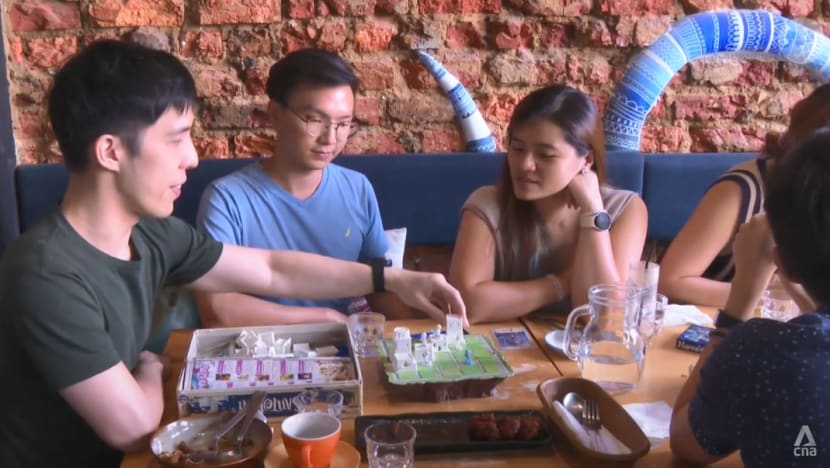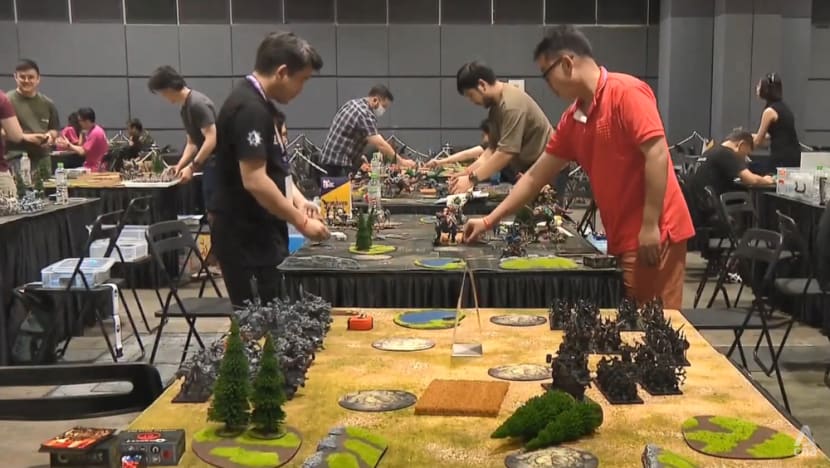Checkmate, Monopoly: Made in Singapore tabletop games are snaking up the ladder
Tabletop games are those typically played on a table or other flat surfaces, and include board games, card games, role-playing games (RPG) and miniature wargames.

A group of friends play a tabletop game at the King and the Pawn board game cafe.

This audio is generated by an AI tool.
SINGAPORE: Before the internet led to a boom in online games and glued players to their computer and mobile screens, tabletop gaming was all the rage.
Children grew up stacking blocks in Jenga, passing “Go” in Monopoly and yelling “Uno!” in, well, Uno.
Today, the Singapore tabletop gaming scene is enjoying a revival.
Game makers and venues told CNA they are seeing an increase in the number of people opting for in-person play experiences and bonding sessions.
Players are also hungry for board and card games with a local flavour, with those featuring durians and kopitiam drinks flying off the shelves.
Such demand has given rise to more domestic game developers and a wealth of opportunities for the budding sector, industry players said.
LOCAL GAMES IN TREND
The number of local indie tabletop game designers has skyrocketed from a handful in 2014 to over 50 today, said Mr Xeo Lye, editor of the Singapore Boardgame Design website.
Businesses and government institutions have also published their own games to increase public engagement, with the trend growing 10-fold over the past five years, he added.
Homegrown tabletop game studio Origame – known for its uniquely Singapore-themed games – has seen a 20 per cent jump in revenue in the past year.
Since the company started in 2019, it has released more than 20 original games.
Its most popular games are big on hawker culture. These include Durian Dash – where players collect Singapore’s favourite fruit – as well as Chope!, which tasks players with reserving tables with tissue packets.
Kopi King, a game where players snatch ingredient cards to make coffee shop drink orders, has sold over 20,000 copies in the nation.
“The modern board game industry is designer-created games that tell stories. Our games try to have stories that resonate with Singaporeans and Asians,” said Origame co-founder Daryl Chow.
“This industry is very developed in Western countries like the United States, Germany, France, where they support their local game makers,” he added.
“We are trying to build the industry in Singapore, and also Asia. It's a very young sector here and we are basically building the industry and our fan base as we go along.”
DEMAND FOR COLLABORATION
Mr Chow said there are increasing partnerships between tabletop developers and other industries in the production of themed games.
One example is a collaboration between Origame and traditional Chinese medicine firm Eu Yan Sang to create the Master Sinseh card game, where gamers play physicians who prescribe herbs.
“Two years ago, I wouldn't have imagined that we could have games that sell in Chinese medicine shops,” said Mr Chow.
The firm also collaborated with iconic comic Mr Kiasu to come up with the Shop Until You Drop card game, where people can play as their favourite characters to get the most discounts.
Such local games are gaining traction not just in Asia, but also in Europe and America, where there is a growing appetite for games that are not made in the West, said Mr Chow.
Internationally, the firm’s top-selling games are Asian-themed.
Some examples are Wok and Roll – a dice-rolling game about stir-fry, and Buffet Boss – a stacking game using miniature food pieces.
MORE FOOTFALL AT GAME CAFES
Board game stores and cafes have also popped up across the island, with demand surpassing pre-COVID levels, industry players said.
Ms Grace Tan and her husband set up the King and the Pawn board game cafe in 2018 after being inspired by a similar concept when residing in London for a year.
She said business was slow at first but picked up significantly once word got around, with Fridays and weekends almost always fully booked.
“The reception has been pretty good and business has been fairly stable. More businesses are holding events (with us) after COVID-19. We’re also seeing more families coming in with their young kids and it’s a really good bonding time for them,” she added.
Mr Isaac Tay, a customer who was playing word game Codenames with his friends, told CNA they visit such game cafes every few months.
“Codenames show how people think about words differently due to their unique life experiences. It can lead to very funny moments where people have very different connections to words,” he said.
“We still play online video games together. But (this) is just a different experience of being able to play, laugh and eat together (at the same time). We also learn more about our friends, especially in a bigger group where not everyone knows everyone that well.”
GROWING TABLETOP SCENE
The growing scene in Singapore saw 6,258 enthusiasts attend the inaugural TableCon Quest tabletop gaming convention at Suntec City last weekend.

Exhibitors showcased their latest products, while visitors got to take part in various activities such as watching demonstration games, painting miniature figurines, and attending talks and workshops.
There were also areas to play games with friends or like-minded attendees, and an extensive game library to borrow from.
“It's important to grow the tabletop community … especially games of local indie design,” said Ms Alanna Yeo, co-founder of game developer Curious Chimeras.
The local studio showcased its games at the event, including Play on Walks, a series of five minigames inspired by a mother who wanted creative activities to engage her children with while taking leisurely walks.
HammerHouse, a game shop in Chinatown, displayed its range of miniature products and painting supplies at the convention.
“I believe in this digital age, we need more analogue (hobbies) for kids. Instead of just being digital, they should have analogue (options) like painting and artistry,” the store’s founder Alex Huang said.
Co-organisers Eliphant and Genesis Frontier said the turnout was promising and the event will return next year.
Ms Elicia Lee, chairperson of the Singapore Games Association, which supports local game developers, said the future looks bright for the sector.
“In the last 10 years to 20 years, the tabletop game industry here has evolved and grown exponentially. We have a pretty good indie scene … and we’re seeing a lot more people making their own games,” she said.
However, game development is not all fun and games.
Ms Lee said it involves various skills, including planning the mechanics, production, design and artwork, game test, printing and packaging, and other logistics. But this also means more jobs and opportunities.
“There’s an entire ecosystem that supports this sector. Our region is still quite young for the industry, and we're growing. There are more opportunities compared to, say, 10 years before,” she said.
“Especially post-COVID, people are craving more in-person experiences. The beauty of tabletop is that it's easy to get into – all you need is the game and a table. You don't need a device, electricity or the internet. So in that sense, it's easier to take up,” she added.

















